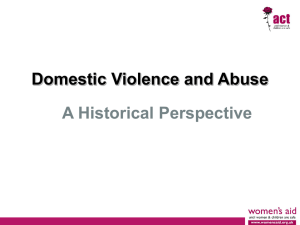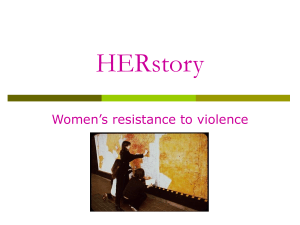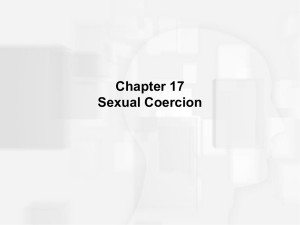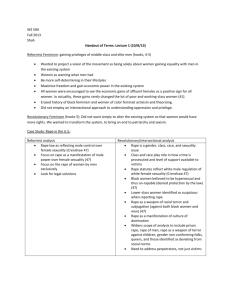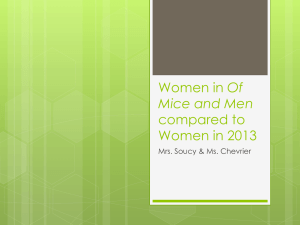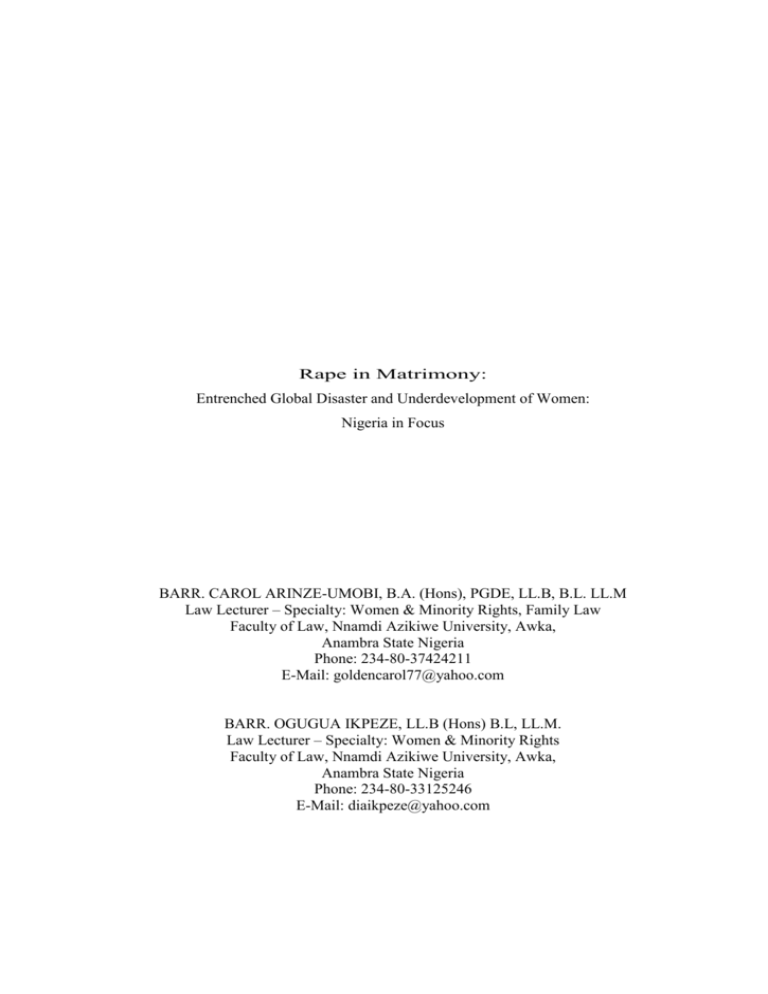
Rape in Matrimony:
Entrenched Global Disaster and Underdevelopment of Women:
Nigeria in Focus
BARR. CAROL ARINZE-UMOBI, B.A. (Hons), PGDE, LL.B, B.L. LL.M
Law Lecturer – Specialty: Women & Minority Rights, Family Law
Faculty of Law, Nnamdi Azikiwe University, Awka,
Anambra State Nigeria
Phone: 234-80-37424211
E-Mail: goldencarol77@yahoo.com
BARR. OGUGUA IKPEZE, LL.B (Hons) B.L, LL.M.
Law Lecturer – Specialty: Women & Minority Rights
Faculty of Law, Nnamdi Azikiwe University, Awka,
Anambra State Nigeria
Phone: 234-80-33125246
E-Mail: diaikpeze@yahoo.com
2
The offence of rape is the most heinous sexual offence under the Nigerian Criminal
Code1.
The abhorrence and repulsion of this sexual offence by the civil society
informed the prescription of a very stiff penalty for it by the draftsmen of the code.
Under section 358 of the Code, it is punishable with life imprisonment. Even an
attempt to commit it is also an offence punishable by a term of 14 years imprisonment
with or without whipping2.
RAPE DEFINED:
The Code3 defines rape thus:
“Any person who has unlawful canal knowledge of a woman or girl, without her
consent or with her consent, if the consent is obtained by force or by means of false
threats or intimidation of any kind or by fear of harm, or by means of false or
fraudulent representation as to the nature of the act, or in the case of a married
woman, by personating her husband is guilty of rape”.
While the Penal Code4
provides thus:
“A man can be held guilty of rape if he has sexual intercourse with a woman without
her consent, or with her consent, if consent is unlawfully obtained”.
1.
2.
3.
Cap. 77 Laws of the Federation 1990
Sec. 359 of C.C. Cap. 77 LFN 1990
Ibid
3
INGREDIENTS THAT MUST BE PROVED BY PROSECUTION
Rape being a criminal offence dealt with in the Code and consistent with the general
principles espoused by section 2(4) of the Criminal Code Act, and Case Law, the
prosecution must prove the concurrence of the physical and mental elements. Added to
this is the general principle in our adversarial system of criminal jurisprudence which
posit that where the commission of a crime is in issue in any proceeding civil or
criminal, such must be proved beyond reasonable doubt4.
To aid proof beyond
reasonable doubt, the prosecution must advert to two vital sections of the code which
were insight as to matters in respect of which proof must be adduced. Accordingly, in
prosecution for rape, the prosecution must prove that there was unlawful carnal
knowledge. Proof of this merely relates to reference to actus reus. Sec. 6 of the Code
defines unlawful carnal knowledge as carnal connection which takes place otherwise
than between husband and wife.
From this definition, it appears that all carnal
connections which take place between persons who are not husband and wife de jure
are unlawful. Though unlawful in the eyes of the law, no criminal liability attaches
unless it is proved that the woman did not consent to it. This is because the hallmark of
the offence of rape is the absence of consent of the victim.
Section 6 of the code also appears to be saying that carnal connections which take place
between husband and wife de jure, are not prima facie unlawful.
But the vexed
question arising from this is whether such carnal connections remain unlawful and thus
not amenable to an allegation of rape even when it is shown that the woman did not
consent thereto. Put differently, is a husband not guilty of rape in having carnal
knowledge of his wife without the latter’s consent? We shall deal with this issue a non.
4.
Sec. 138(1) Evidence Act Cap. 112 Laws of the Federation 1990.
4
We must also hasten to add that it is also part of the physical elements (actus reus) of
the offence for the prosecution to prove, consistent with section 6 of the code that there
was penetration. This is because S. 357, which defines the offence of Rape has made
proof of unlawful carnal knowledge a material element of the offence. To appreciate
what combination of acts that can amount to proof of unlawful carnal knowledge, Sec.
6 of the code lightens that task by providing that where the term carnal knowledge or
the term carnal connection is used in defining an offence, the offence as far as the
elements of it is concerned, is complete upon penetration. What this in essence means
is that in the determination of the question whether carnal knowledge of the victim had
been had by the accused, the point at which to start courting or the point at which it
could be said that carnal knowledge had been had in law is the point in time at which
the accused achieved penetration. Before penetration is achieved, proof of unlawful
carnal knowledge would be impossible. At the time at which it is achieved, that
element is proved and it would be immaterial that the accused thereupon withdrew and
abruptly discontinued the act of ravishment4a. Evidence showing that the accused
continued in the act and discharged semen is also dismissible in proof of carnal
knowledge. See RVS Marsden5. It has also been held in R vs. Russen5 and Jegede vs.
State (supra) that a degree of penetration so slight and light not to have caused any
injury or laceration of the hymen would be sufficient in law for the offence of rape to
be complete, while the mere fact that the victim is a virgo intacta does not mean that
carnal connection has not taken place. The court, from the surrounding circumstances
if it is satisfied, will reach a contrary decision.
4a.
5.
Legal Opinions of Barrister Okey Onunkwo, Lecturer, Faculty of Law, Nnamdi
Azikiwe University, Awka, Anambra State, Nigeria.
(1891) 2 QB and also Jegede Vs. State (2001) FWLR (Pt. 66) 72 at 73.
5
Furthermore, a dissection of the meaning of Rape explicit in S. 357 of the Code reveals
that the offence called Rape can only be committed on a woman or girl. In other
words, the victim of that offence must always be a human being of a feminine gender.
It is a legal impossibility for a human being of the masculine gender to be a victim of
that offence. The assertion that X, a lady rape Y, a man cannot be correct in the light of
the definition of rape as espoused in section 357 of the Code.
Added to this
impossibility is the physiological impossibility attendant on the constitution of the male
body.
Since proof of this offence requires inter-alia proof of unlawful carnal
knowledge, and since unlawful carnal knowledge is complete upon penetration, the
constitution of the male body does not admit of such penetration. Therefore, the
offence enacted in the Code, called Rape by its definition is not such that a male can be
the victim in respect thereof. The argument that a male has an anal orifice which can
be penetrated holds no water. When such happens, the resulting offence is not rape but
rather an entirely different offence referred to as intercourse against the order of nature.
But we must quickly add, that though a woman or girl is always a victim (prosecutrix)
of the offence of rape, it does not follow that in law she cannot be convicted of rape.
The mere fact of their physiological impossibility does not mean that they cannot be
parties to rape under section 7b – d of the code. When dealing with parties and any
female whose activities bring her within the ambit of the said Section 7, is said to be
guilty of the offence and may be charged with actually committing it. Accordingly,
where a woman or a girl does not do the forbidden physical act of the offence, but
merely aids, or counsels a man to rape another woman or girl, the first mentioned
woman or girl is guilty of offence of rape either as an aider or a counsellor. See R vs
Ram6.
6. (1893) 17 Cox 609
6
A lucid example was in 1973 when two ladies were convicted for raping a man7.
Where she procures a man for the purposes of raping another woman, she is liable
under Sec. 7 as a party.
Having examined rape, its ingredients which prosecutrix must establish in order for
rape case to succeed, we shall now more particularly deal with this issue – CAN A
HUSBAND BE GUILTY OF RAPING HIS WIFE?
The general import of Sec. 6 of the Code is that a man cannot be guilty of rape against
his wife. Sir Matthew Hale in Seventeenth century justified this position when he
stated thus:
“The husband cannot be guilty of a rape committed by himself upon his lawful wife,
for by their natural matrimonial consent, and contract, the wife hath given up herself in
this kind into her husband which she cannot retract8. But Blackstone9 has stated that
there are instances where a man can be guilty of raping his wife. These are:
(a)
Decree of judicial separation where a competent court has ordered a decree of
judicial separation, the wife is no longer bound to cohabit with the husband and
any attempt on the part of the husband to have unlawful carnal knowledge will
be tantamount to rape. See the case of Clark10.
(b)
Where there is a divorce nisi. The court is the case of R vs. O’Brien11 held that
a decree nisi of divorce effectively ended a marriage. Thus it was possible for a
man to rape his wife.
7.
8.
9.
10.
11.
See “Sexual offences in Nigeria revisited”. A paper presented by Professor
David Ijalaye to the Campus Chambers of Obafemi Awolowo University, IleIfe, 1982.
Smith J.C. Hogan, B. Criminal Law 5th Edition (1983): ELBS / Butterworth,
London: 405
To have and to hold; The marital Rape Exception and the Fourteenth
Amendment 99. Harvard Law Report 1986, 1255.
(1949) 2 All E.R. 443; Miller (1954) 2QB 282.
(1974) 3 All E.R. 663
7
(c)
Also where an injunction has been granted against the husband from molesting
his wife or where he has given an undertaking to the court not to molest his
wife, a similar situation will apply12.
Apart from these statutory exceptions, arguments have been that a husband cannot be
guilty of rape of his wife by the mere reason that she has given a single blanket consent
on the day she accepted to enter into the contract of marriage with the husband, violent
sexual intercourse also inclusive. More so, the incident of rape of a wife by her
husband is unknown in customary law as the wife is the property of the husband and so
he is free to have her at will. The wife is not expected to complain.13 One major reason
given to justify this form of violence is that it is based on payment of bride price and
once that is paid, husbands now own their wives and therefore could discipline them;
this gives the impression that consent perpetuates the idea that a woman is a piece of
property owned by the husband. The only concept that is constant is change, and for
there to be dynamism, growth and development, change must be constant. It will
therefore be wrong for the world, particularly the developing ones like Nigeria to cling
tenaciously to the pronouncement of Sir Matthew Hale in the 17th century that because
a woman has given up her consent, she cannot retract that even in the face of a very
violent relationship. Most rape cases, particularly spousal rapes are unreported and
thus continues unabated.
Most women have lost their lives as a result of violent sexual relationships (particularly
rape from their husbands) and what petrifies any right thinking person is the Police
lackadaize in assumption of
12.
13.
Nigerian Law: Contemporary Issues, Ed. Prof. (Mrs.) M.O. Ogungbe
Igbenedion, 2003.
Commonwealth Secretariat, Violence Against Women, London SW1 5HX
8
jurisdiction to arrest the situation. Probably misled by the fact that such violence falls
under the “domestic terrain” and as such beyond Police jurisdiction, or out of respect
for the privacy of the family; because of the mistaking vision of marital rights; the
belief that the victim has ‘provoked’ the violence; because they do not foresee a
successful prosecution and finally because the police prefers to treat domestic crimes
differently from crimes, responding by mediation rather than law enforcement14.
In line with most states that have excluded rapes within marriage from the coverage of
rape laws, Nigerian Code also in this category recognises that unlawful carnal
knowledge of a woman without her consent amounts to rape, but makes an exception in
relation to husband and wife. The code has called it sexual assault where such happens
in a matrimonial setting as against rape. It is observed that a rape is a rape not minding
against whom it is committed and who commits it.
The provisions of section 6 of the code apart from being discriminatory, antidevelopmental and statutory perpetration of domestic violence, is a manifestation of the
patriarchal mentality that he who has a tank of water cannot be accused of stealing one
bucket from it. The world, particularly the developing ones like Nigeria, must wake up
to the stark realities that women as human beings are endowed with inalienable rights
which inter-alia includes right to dignity of human persons and freedom from torture.
The adherence to the provision of section 6 of CPA clearly is a flat contradiction in
terms with the provision of particularly sections 34 and 35 of the Fundamental Rights
enshrined in Chapter IV of the 1999 Constitution of Federal Republic of Nigeria (right
to liberty and dignity of human persons) and the supremacy clause of the same
Constitution under its Section 1, that any law that is inconsistent with the Constitution
to the extent of its inconsistency is null and void and of no effect.
14.
Guidelines for Police Training on Violence Against Women and Child Sexual
Abuse. Commonwealth Secretariat, London. SW1 5HX
9
Is this not enough authority for there to be a review of Section 6 and 357 of the
Criminal Procedure Act and effectively to modify them and more particularly making
sexual assault even in matrimonial setting a criminal offence of rape, punishable with at
least 5 years imprisonment?
Refusal to call a spade a spade as far as spousal rape is concerned amounts to
government expressly promoting ills in the society, which particularly puts women
down, making them second class citizens.
Nigeria is called upon to wake up and revisit their criminal statute books with a view to
joining other several states that have reviewed their laws of rape to protect wives from
being sexually assaulted by their husbands like the States of Oregon, New Jersey, Iowa
and Delaware15.
The United Nations, at the forefront of Elimination of Violence and Discrimination
Against Women, has developed standard setting instruments below which any country
cannot fall without being termed barbaric. It has defined the term violence16 against
women in its Article I to mean “any act of gender-based violence that results in, or is
likely to result in physical, sexual or psychological harm or suffering to women,
including threats of such acts, coercion or arbitrary deprivation of liberty, whether
occurring in public or private life”.
There is no reason why marital rape should not be viewed seriously as contravening the
provisions of Article 1 of this Convention, causing physical, sexual as well as
psychological harm. A woman with a dislocated psyche is a human vegetable, unable
to develop herself in any form.
15
16.
Susan Deller Ross, Ann Barcher, The Rihts of Women, Toronto, New York,
London, Sydney, Bantam Books. 1983.
(1993) The U.N. General Assembly adopted the Declaration on the Elimination
of Violence Against Women in General Assembly Resolution 48/104 of 20
Dec. 1993.
10
Blackstone17 in 1765, one of the fathers of English law, said:
“By marriage, the husband and wife are one person in law; that is, the very being or
legal existence of the woman is suspended and consolidated into that of the husband”.
Two hundred years later, this view is still being upheld.
Indeed, the struggle to
increase the scope of married women’s rights to equal those of unmarried women has
been and still remains part of the global striving towards equal rights for women18.
There must be a rethink and a change of mental chemistry particularly if marriage
means suspension of a woman’s legal existence, according to Blackstone, even unto her
death.
CEDAW in addition provided detailed commentary on the implications of violence
against women for the specific rights guaranteed to all women under the Women’s
Convention, such as life, protection against ill-treatment, equality in family and equal
protection of the law19. Nigeria signed CEDAW in 1984, ratified it in 1985 and there is
no reason why she should not apply the contents of the convention remembering that
she ratified without reservation. Domesticating CEDAW in Nigeria is sine qua non.
GLOBAL EFFECTS OF RAPE IN MATRIMONY / INTERVENTION STRATEGIES
The relationship between Globalization, Laws and National development are currently
of great importance to citizens, governments, non-governmental organizations in
general and to women in particular.
17.
18.
19.
W. Blackstone (1765) Commentaries on the Laws of England, Vol. 1, Oxford
p.15, 111.
Katarina Tomasevski, Woman and Human Rights, Zed Books Ltd, London &
New York, 1999
Ibid
11
The real essence of globalization, which had been on for at least 2 decades now aims at
interconnectedness and interdependence of all parts of the world. Whereby event in any
part of the world will be seen as having the potentiality of affecting people in other
parts of the world. Moreso, the topic of discourse seeks a global comparative analysis
of matrimonial rape, its effect on women empowerment and development. It is believed
that sexual intercourse in marriage should be by mutual agreement between husband
and wife so as to guarantee peaceful existence and progress both in the homes, nation
and the world at large. Aimed at realizing a better global human progress, politically,
economically and socially.
Aimed at realizing a better global human progress, politically, economically and
socially.
This idea is disseminated by enhanced communications via the Internet, Seminar,
Conference and Ex-change programmes, Local, Sub-regionally, Regionally and
Internationally.
It is apparent that matrimonial rape exists globally. Thus some Countries such as
Norway, Sweden, Denmark, Finland, Queensland and Australia20 have reversed their
Rape Laws to take care of it while some States in the United States like Oregon,
Delaware, New Jessey, Iowa Massachusetts have rewritten their Rape Laws to protect
wives from being sexually assaulted by their husbands, as already mentioned.
It is a truism that marital rape exist from the belief that a woman even as a wife must be
dominated so as to confirm the husband’s superiority and put to rest his powerlessness
in certain circumstances and fear of rejection by his spouse.
To examine the effects of marital rape, the following sub-headings will be considered:
1. Personal Effects: Often, there are negative, enormous, unquantifiable and innate
effects, which are further stated as follows:
20
Igbenedion, Op. Cit. Page 323.
12
a. Physical – It is manifest a-times by bodily injuries especially around the vagina
as a whole or around the introitus that is the vaginal orifice.
Again, there may be apparent injuries on other parts of the body especially at
the back.
In a case study, a wife frequently raped by the husband showed numerous scars
at her back indicating the bites she received whenever she tried to resist her
husband’s sexual assaults. The state of her wears are better imagined by this
audience.
In another case, a wife, a pharmacist by profession, had to scale the wall naked
into our compound after being raped by her husband.
Later, she summoned the courage and separated from her husband, who
incidentally was a Medical Doctor. He eventually died of HIV/AIDS. Not too
long after, the deceased husband’s known sexual partner also died. This
explains her resistance to sexual intercourse with her husband which now
resulted in the excessive violence.
b. Psychologically or emotionally, most women raped, whether in matrimony or
otherwise, exhibits mental disturbances by way of being:
Fearful
Withdrawn
Miserable
Abnormal behaviour or
Behavioral change
Most cannot bear the shame and pain thus relocate or commit suicide.
c. Economical – The combined effects of (a) and (b) above leads to pain and loss
of interest to one’s environment, as well to business. It could also lead to
dismissal from the wife’s employment, which results to loss of income.
2. SOCIETAL EFFECTS
It is obvious that anything that affects individuals in any given society affect the
society as an entity a-times spread globally. Thus rape in matrimony may as well
have:
a. Socio-cultural consequences viz:
i. Traumatized society – Consideration to high rate of spread of diseases like
the HIV/AIDS scourge, there will be eventual loss of life of the victims.
Also great nervous wreck of the spouses who undergo the sad experiences.
Some will get to the extent of attempting suicide or committing suicide or
remaining depressed.
13
ii. Globally, high divorce rates will be witnessed with the resultant instability
in homes and the society at large. The act of nurturing the younger
generations positively will be burdensome.
iii. There may be real threat to the institution of marriage. As the wives will
prefer to hold unto their consent and remain single since the common law
position is that the wife subjects her right to refusal to sex or non-consenting
the moment she agrees to marry her husband.
As Sir Matthew Hale stated in the seventeenth century cited supra –
That, in effect means that rape committed by a husband is overlooked under the
rule of law. Surely, the provision is not only archaic but contrary to the
provisions of the Nigerian Constitution under the Fundamental Rights
Provisions21.
By all intents and purposes at no point in time was rape envisaged in
matrimony.
However, in Alawusa Vs Odusote22, it was held that if a husband uses force or
violence to obtain intercourse, he may be guilty of assault or wounding. I dare
say of rape. Though the full force of law may not be meted to him.
21.
22
Chapter IV of the 1999 Constitution especially as regards Sections 34 & 35 on
right to liberty and dignity of human person.
[1941] WACA Page 140.
14
b. Economical:
Due to high incidence of illness, there will be huge expenditure on medications
or medical treatment by even the Government or support groups to the victims.
As well as loss of interest in the environment and employment resulting in loss
of workforce and low input and output by working wives who are victims of
marital rape. In the end, the nation will be the worse for it.
INTERVENTION STRATEGIES
Marital rape is hardly reported anywhere in the world. As current laws whether
International or National hardly protect wives from rape by their husbands, as marriage
is often the exception clause.
The rationale being the common law rule that by being married, the wife has consented
to allow future sexual contacts with her husband including violent ones. This has really
hindered the Courts from adjudicating otherwise. Though we know that in 1979, a
Massachusetts man was convicted of raping his estranged wife. This is judicial activism
and more of it is desired if only to achieve sanity in matrimonial relationship and
accord dignity to wives during sexual activities with their husbands.
1. Counseling: It should start immediately parties agree to marry. Both would-be
husband and wife should be counseled on sexual activities’ as some argue that
some men hardly believe that their wives are capable of enjoying sex without
force.
2. Support Group: For the psychic of the wives to improve, there is need to have a
place to run to or lean on with a sense of visible security.
3. Law Reforms: There is great need to rewrite most laws on rape for they are
antiquated. Again, there must be a wholistic approach to rewriting the laws.
For example, the tenets of the Nigerian Criminal Code should take into
cognizance the provisions of the Constitution on Fundamental
Human Rights23 so as to avoid any conflict. Recourse should be had to the
current human rights issues especially the provisions in
the Universal Declaration on Human Rights with particular reference to
according dignity to the human person and right to liberty. Therefore, the
marital rape exception should be repealed immediately while cue on law
reforms can be taken of the Scandinavian Countries and the United States of
America and other States with such laws as previously mentioned.
15
4. Need for visible Judicial Activism: The Courts ought by now to be alive to
upholding justice in the highest transparent forms. By treating cases relating to
women and wives in particular with utmost regard to equality of all human
beings24.
5. Re-orientation of the Citizens: It must start at all levels especially at the grass
roots level bearing in mind the customary law(practice) influence on the male
behavioural pattern. Focus had on the Youths so as to achieve the desired
attitudinal change in expressions pertaining to matrimony and sexuality.
6. REHABILITATION: A victim of matrimonial rape needs rehabilitation, be it
in relocating her and probably with her children or securing a job for one who
would have lost her job. Or training in craft for one who is neither educated or
possesses any art in craft, since engagement in labour and earnings can assist
her in recovering fast.
7. The role of the Media: There is no gainsaying that the Media activism will
assist in curbing matrimonial rape. Albeit by creating awareness and jingles that
will educate the members of the society.
23.
24.
Chapter IV of the 1999 Constitution of Federal Republic of Nigeria, particularly
Sections 34 and 35.
Section 14(3)(c) of the 1999 Constitution of the Federal Republic OF Nigeria.
16
CONCLUSION
Lord Mathew Hale’s position as well as the provisions of the common law and by
extension the Nigerian Criminal Code25 and Penal Code26 are no longer tenable in
modern legal systems universally. The 20th and 21st Centuries have witnessed a lot
of social engineering in law reform albeit by judicial activism. As Lord Lane stated
in Regina Vs R27 that
“we take the view that the time has now arrived when the law
should declare that a rapist remains subject to the criminal law
irrespective of his relationship with his victim”.
Moreso, as this view was supported by Lord Keith when he posited that husbands
and wives are now for practical purposes equal partners in marriage thus a wife is
not obliged to obey her husband on all things nor to suffer excessive sexual
demands on the part of her husband….the wife’s health must be held paramount.
Furthermore, it is indeed doubtful that the Common Law envisaged Lord M. Hale’s
views considering the fact that the Common Law tenets on marriage developed
from the Canon Laws. Thus,
“…….the idea that wife by marriage consents in advance to her
husband having sexual intercourse with her whatever her state of
health or however proper her objections is no longer acceptable.
It can never have been other than a fiction, and fiction is a poor
basis for the criminal law”28.
25. Section 357 and 358.
26. Section 282.
27. [1992] IAC Page 599 at 611.
28. Per Lord Lane quoted in Spousal Immunity For Rape Under the
Nigerian Criminal Code: Opening the Doors to Criminal Prosecution by
Samson Kayonda; in LASU LAW JOURNAL. Vol IV Issue 2 2002 Page 113.

